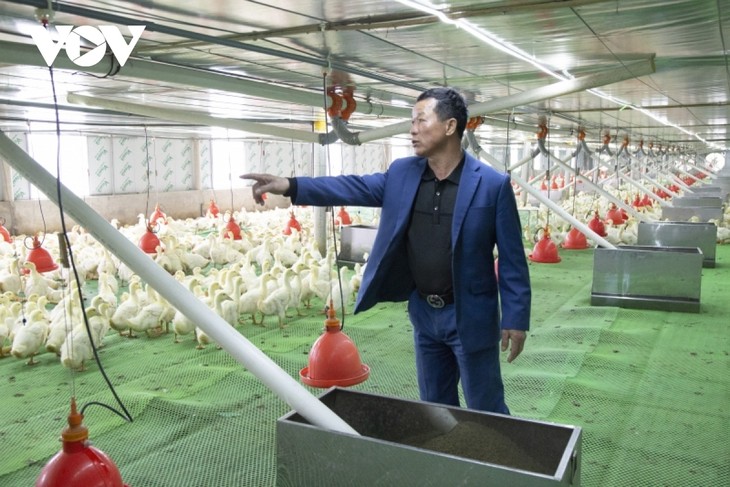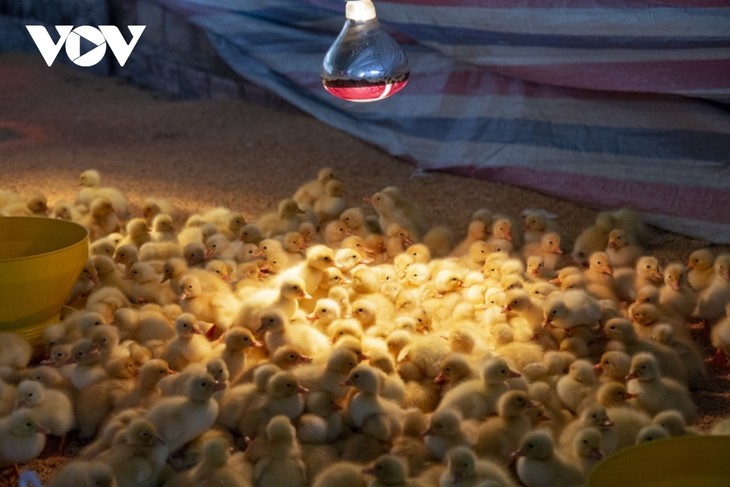(VOVWORLD) - Farmers in Quang Yen town in the northern border province of Quang Ninh are adopting high-tech models of duck farming to reduce poultry diseases and increase their profits.
 The air-con system and the concrete floor covered with a net help Cuong’s ducks grow well and minimize environmental pollution. The air-con system and the concrete floor covered with a net help Cuong’s ducks grow well and minimize environmental pollution. |
“The use of cool, closed cages to raise ducks is more efficient. Environmental pollution is minimized and diseases are more controlled.”
Dong Quang Cuong, a veteran duck farmer in Cam Luy hamlet, said ducks used to be free-range. This traditional method was costly and the ducks were vulnerable to many diseases.
Cuong researched and applied digital transformation to duck farming to increase profits and limit health risks in the breeding process.
“The traditional method requires from 2.7 to 2.9 kg of feed to produce one kilo of live duck. With cold cages, we need only two thirds of the feed. Raising 10,000 ducks outdoors requires 8 workers but only one worker is needed for the new model,” said Cuong.
According to Cuong, raising a large number of ducks outdoors makes it difficult to manage the ducks, control disease risks, and minimize environmental pollution.
Last year, he invested more than 210,000 USD in renovating and upgrading his 2 barn systems, which cover 3.5 ha. The new system is airy, the floor is covered with a net of 50 cm above the concrete floor, the ceiling is insulated with corrugated iron, and the building is equipped with an air-conditioning system and an automatic feeding and rack system.
 The automatic incubator helps Cuong reduce much production costs and ensure the health of the ducks. The automatic incubator helps Cuong reduce much production costs and ensure the health of the ducks. |
High-tech farming has many benefits. It helps the ducks cope with the climate and grow evenly with high meat quality. The farmers can monitor and manage development indicators and provide food, water, and medicine remotely.
Cuong has 15,000 ducks, half of them for eggs and half for meat. The new closed farming model and controlled vaccination keeps the ducks healthy. The average duck weight is about 3.6 kg after one and a half months.
Cuong's farm sells more than 15 tons of live ducks per month, with prices ranging from 1.8 to 2 USD a kilo.
He has invested in 4 automatic incubators to produce fertilized duck eggs and breeders.
The duck waste is fully utilized to raise fish and grow pomelo and litchi. Cuong also supplies animal feed to the locality.
His family earns approximately 43,000 USD a month from the garden-pond-livestock model.
“When our preliminarily processed ducks are resold in Quang Ninh, the price can be up to 3 USD for one kilo. The intermediary phase increases the cost. I want to invest in preliminary processing and find a reliable outlet so I can achieve sustainable growth,” Cuong said.
Le Van Do, Vice Chairman of the Quang Ninh provincial Farmers' Association, praised Cuong in taking the lead in applying digital transformation to the production process to generate high income for himself and others and being the head of the livestock farm association of Cam La commune.
“He has helped other local households participate in the duck production chain and improve their product value,” said Do.
Cuong's model of raising ducks in cold barns is being followed by other farmers in Quang Yen town. Their products are now available not only in Quang Ninh but also in the central and southern regions.